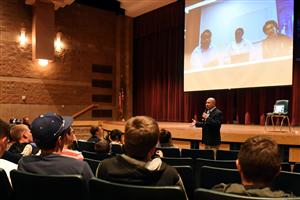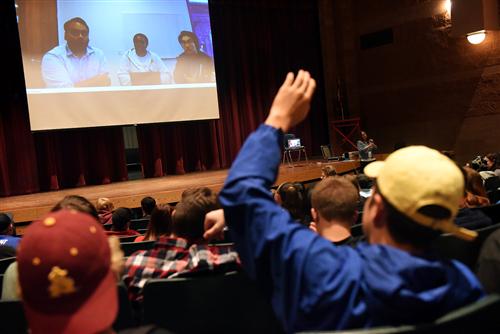 Hundreds of students from District 49 middle and high schools exited classrooms Oct. 6 to meet employers representing several engineering specialties.
Hundreds of students from District 49 middle and high schools exited classrooms Oct. 6 to meet employers representing several engineering specialties.
The day started with a trip to the Southern Colorado Manufacturing Expo at the Mortgage Solutions Financial Expo Center in Colorado Springs. Presented by the Pikes Peak Manufacturing Partnership, nearly 100 employers awaited students with exhibition booths.
After returning to Sand Creek High School, students entered the auditorium, where they’d meet three Google employees. Hosted using Google Hangouts, the event was coordinated by Todd Matia, a teacher increasing campus support for computer science and engineering concentrations.
Matia is a teacher leader for the upcoming School of Design. Under the theme “Connections To The Real World,” he’s planning quarterly meetings with leaders in engineering.
“We want to give our students access high level companies, so they can see themselves doing these types of jobs,” he said, preparing the video chat.
Chatting from Google’s corporate headquarters complex in Mountain View, California, were test engineer Bramha Ghosh, and software engineers Sabrina Williams and Addison Luh. The high school's setup included a large overhead screen and two-way audio and video feeds.
When asked about programs to help novice coders, Bramha, who’s starting his fourth year at Google and finding ways to make it easier for engineering teams to build, test and deploy components of Google's ad serving infrastructure, said, “If you get stuck, Google it.”
“Put in a little bit of effort, then ask for help, then put in a little more, then ask for help — that’s how I built my career,” said Bramha. Before that, he developed tools to make it easier for companies to design and deploy social ad campaigns.
Asked about programming languages, Bramha mentioned C++, Java, Python and Go, but admitted that knowledge of a specific language isn’t what’s most important.
“It’s not so much what language you know, but that you know how to program an object-orientated language,” Bramha. “Practice coding, and keep practicing. But keep it fun. Build an app. The app can be the dumbest thing in the world, but it’s something you can play with.”
“I like the gadgets,” said Williams, who’s worked at Google for four years, covering Chrome, Google X, and ads and commerce products. “We get to play with amazing technology. There’s lots of imagination and creativity happening here.”
When asked about employment at Google, Williams talked about the importance of computer science degrees, but also a well-rounded education. She earned bachelor’s degrees in philosophy and computer science.
“You should all take a philosophy class, because it teaches you how to argue,” said Williams, discussing collaborative developer environments. She’s scheduled to join the U.S. Digital Service team this fall in Washington.
“Knowing how to argue, how to form a logical argument, is important,” she said.
Emphasizing the point, Bramha suggested, “Technology is a people problem. There are a lot of engineers here. The ones I like to work with are the one’s who are easy to work with. And that’s not something you learn in a computer science class.”
Google Employees The group talked about employee benefits, travels abroad, seizing opportunities, why it might help to include code samples with a resume, and how working for more traditional organizations prepares someone for a uniquely creative environment, like Google.
“We’re very creative here,” said Luh, who works on building software tools and infrastructure for other engineers in display ads teams. He's been at Google for almost three years. “You can’t be uptight or unwilling to take suggestions.”
“The breadth of what we do here is crazy,” said Bramha. “So, there’s a coolness factor, and the environment itself. It’s very relaxed here, and results driven.”
Tenth-grader Ethan Catanach, 15, is taking a class about engineering principals, which looks at how technological systems and manufacturing processes fit into problem solving processes, as well as the social and political consequences of technological change.
“It was interesting to know how many skills apply there, when you work at Google,” said Ethan, who’s interested in pursuing computer science in college.
“We got to talk with people doing what we want to do when we’re older,” he said. “It’s reassuring to know what we should do, what we should study.”

 Hundreds of students from District 49 middle and high schools exited classrooms Oct. 6 to meet employers representing several engineering specialties.
Hundreds of students from District 49 middle and high schools exited classrooms Oct. 6 to meet employers representing several engineering specialties. Comments (0)(0)
Comments (0)(0)

